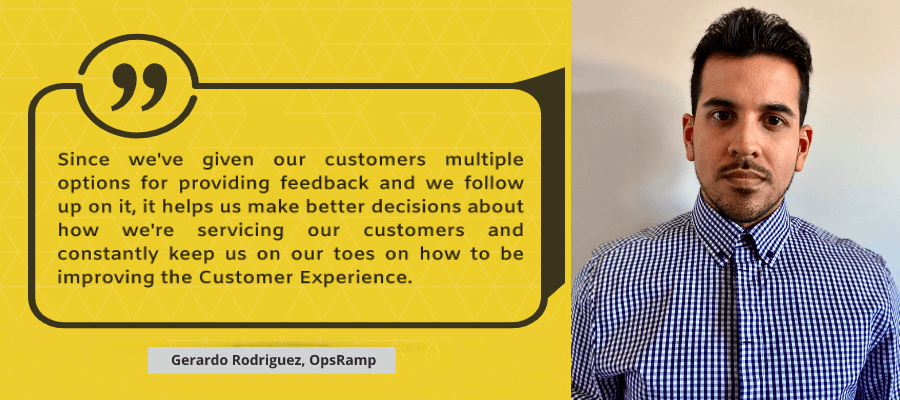Amit Kalantri famously wrote, “Nothing consoles and comforts like certainty does”.
The concept applies to most areas of life, but it carries a special message for small business. To feel certain that the product or service you’re offering is a “wow” experience is one of the most powerful goals a business can have. And the surest way to wow customers is by encouraging customer feedback through a thoughtful combo of skill and technology.
Getting customer feedback may sound straightforward: send out a nice email, pop up a 5-star rating box, and voila! you’ve got a review. But step into user shoes for a moment. Remember how often we take it for granted that a product intuitively grasps our needs or is stuffed to the brim with cool features. Or how many feedback requests we’ve ignored in the past month.
How do you avoid the trap of poorly optimized feedback, disinterested, or grumpy customers? What digital tools should you use, and which ones should you drop? We asked five global experts in small business to share insights accumulated through years of experience.
Let’s go!
1. Encourage customer feedback via different channels

Company info: OpsRamp | SaaS | California, USA
Any time when you struggle with a substantial amount of ignored customer feedback requests, it’s time to rethink your customer feedback strategy. The problem is most likely the communication approach, which is not convincing enough to your audience (even if it works for someone else).
Gerardo Rodriguez, Senior Technical Support Manager at OpsRamp, relates how a revamped feedback strategy impacted his company. “Previously, our Customers had a very limited amount of ways they could deliver feedback to us. Once we started tracking how feedback was coming in, we noticed our engagement was quite low, so we decided to make changes to our processes.”
The changes implied a greater range of feedback channels and results were quick to show. “Since we’ve given our Customers multiple options for providing feedback and we follow up on it, it helps us make better decisions.”
“[Formerly], engagement on feedback inquiries was below 8% but is now at 34%,” Gerardo adds.
Tracking your active customer interaction channels is key to getting the most productive feedback. Channels to encourage customer feedback include: Customer Feedback Management (CFM) apps and services, Customer Relationship Management (CRM) or Case Management System (CMS) services, Phone, E-mail, Social Media, Google Reviews, web reviews, Chat, Surveys, and more.
2. Don’t leave customers second-guessing (and don’t do so yourself)

Company info: Edge Marketing | Digital Services | Gold Coast, AUS
A lot of failures in life are a result of second-guessing. Instead of plainly asking, we lose hours ruminating over what other people think and want. In a business environment, second-guessing is even more ridiculous and will always lead to poor ROI. If we turn the tables, though, the same applies to your clients. You should never leave customers wondering about the credibility of your business.
After encouraging feedback from customers, Sean Clancy, SEO Director at Edge Marketing in Australia, became aware of a customer service problem. “As we are an online agency, people expected us to be on Facebook messenger or emails all day every day. [The most surprising feedback] was us not being available 24/7.”
Thanks to timely feedback, Sean implemented digital tools that help users in different geographies feel equally heard and cared about.
“We did implement auto-responses on our FB and email systems to let people know our working hours and when they are likely to receive a response if they contact us outside of those days and times.”
For an online business, where 30%-50% of sales go to the business that responds first, such a simple tweak in customer experience made a lot of impact.
Learn more: 5 Customer support tools that work while you sleep
3. AI is good; people are better

Company info: MightyCall | SaaS | California, USA
In marketing and sales, businesses use a lot of automation tools to facilitate processes. But like every digital tool, automation can become a wall between you and your clients when used as a replacement for human connection.
Anna Miranchuk, our own award-winning Product Manager at MightyCall, explains the importance of picking up the phone and finding a personal approach to every client. “We use several successful feedback channels. Some, like our live support, e-mail, and feedback forms, are always available. When launching new functionality, we always include a feedback request right in the new interface.”
If you’re a growing business, getting live feedback over the phone shouldn’t be taken lightly.
“It’s usually thoughtful, rather than spontaneous communication that gives the best results,” Anna underlined.
Here are the essential components Anna mentions as critical to successful customer feedback over the phone:
- Select your target audience prior to the phone call
- Share the subject of your conversation in advance
- Allow the customer to schedule the date/time by themselves
- Map out the goal of the conversation, why you wish to talk to this person in particular, and jot down important questions
- Always be flexible and get a feel of the person you’re talking to, adapting your questions as you go. Often it’s the unexpected turns that lead to the deepest insights!
4. Get customer feedback across to the right people

Company info: English Blinds | E-Commerce; Retail | England, UK
Being in retail and online businesses at the same time is a tough double act. For such companies (or any growing business), gathering successful feedback from many channels is only half the deal. The critical part is getting information across to the right people. Unfortunately, that is precisely the stage where many businesses stumble.
John Moss, CEO of English Blinds, shares a story where feedback could’ve easily been overlooked. Instead, it became a game-changing impulse for his business.
“We manufacture and retail window blinds and dressings and our showrooms are divided up into specifically themed sets,” John says. “One [set] was carpeted, prompting a comment on the feelings and associations generated by that new carpet smell. [It] was something of a revelation for us was when a customer commented on the…impact that [smells] have on the shopper experience and buyer journey.”
Sensory marketing is a popular “trick of the trade” in food industries (e.g. that fantastic freshly-baked bread smell in your local supermarket makes you eager to shop). Nevertheless, it’s easy to see how feedback like that could have been ignored in the home improvement sector. Instead, John’s team gave it due attention and passed the right info to the right people.
The resulting changes, John adds, were considerable.
“We built on this feedback to… produce an immersive shopper experience, and targeting multiple senses, particularly one with such a strong association with memory as smell. [It] became something of a game-changer for us.”
5. Use uplifting feedback to boost company values

Company info: Hollingsworth | Logistics | Michigan, USA
Feedback comes in many shapes and sizes. There’s positive, sunny feedback that makes your day brighter. There are angry social media trolls who project negative vibes to ruin your day. And then, there’s feedback that will leave you thinking because it’s not about some cool feature or service to implement, but your deeper company values.
This is something that Pat Donovan, Director of Operations at Hollingsworth, a logistics company catering to the whole of North America, encountered. “One client asked us to provide a waiting room because truck drivers are often exhausted and want to be comfortable,” Pat shares. Many a company would overlook a concern that wasn’t “top priority”. However, Hollingsworth saw it as an opportunity to invest in values.
“We know their concern is valid and want our clients to feel like family. [As a result] we revamped our waiting rooms and made them more interactive and friendly with snacks and drinks.”
The fact that the company noted this feedback expressed by one client speaks tons about its customer service and core values.
Why is customer feedback important?
- Adapting to customer needs: Understanding and responding to customer feedback is crucial for meeting their evolving expectations and enhancing their satisfaction.
- Business growth and innovation: Gathering insights from various sources can lead to innovative ideas, helping businesses stay ahead of the competition.
- Quality improvement: Regular feedback helps in identifying and fixing issues, leading to continuous improvement in products and services.
- Brand loyalty: Engaging with customers and valuing their opinions fosters a sense of community, enhancing brand loyalty and advocacy.
- Market relevance: Feedback keeps businesses aligned with market trends, ensuring they remain relevant and successful in a dynamic environment.
Time to start collecting feedback!
The journey of a small business is filled with challenges and opportunities. By embracing diverse perspectives, focusing on customer feedback, and staying adaptable, small businesses can carve a unique path to success. Balancing strategic planning with a passion for innovation allows them to grow and thrive in a competitive landscape, turning obstacles into stepping stones for achievement. In the world of small businesses, the right approach and dedication can transform aspirations into realities.




























